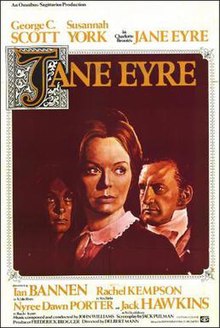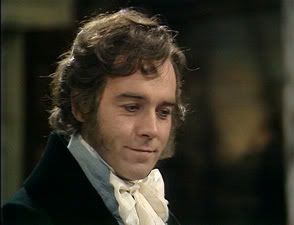I'll start with the one I wouldn't really recommend, the 1970 adaptation starring George C. Scott and Susannah York. The only thing that *may* save this one from being the worst Jane Eyre ever it is my recent discovery of the 1949 TV episode adaptation of Jane Eyre starring Charlton Heston and Mary Sinclair. And then there is always the 1934 adaptation with Colin Clive and Virginia Bruce. So it would not be an easy automatic decision.
 What can I say about this adaptation of Jane Eyre? Susannah York did NOT make a convincing Jane Eyre. While this couple managed to still have a twelve year age difference, it wasn't because she was so young, quite the reverse. She was over thirty and trying to play a young woman of eighteen, nineteen, or twenty. It did NOT work well. In my opinion. She was not convincing in her role as a young, plain governess. And I had a hard time believing in the romance of this couple. George C. Scott, likewise, did not make a convincing Mr. Rochester. In fact, none of the actors--at least the human ones--were quite believable in their roles in this movie. (The horses and Pilot did okay for the most part.) Now, some did better than others. I won't lie. Not everyone was equally horrible. And part of the trouble could have been the script. (The Rivers family are not her cousins, she doesn't receive an inheritance, etc. Also the Reed family does not appear at all.)
What can I say about this adaptation of Jane Eyre? Susannah York did NOT make a convincing Jane Eyre. While this couple managed to still have a twelve year age difference, it wasn't because she was so young, quite the reverse. She was over thirty and trying to play a young woman of eighteen, nineteen, or twenty. It did NOT work well. In my opinion. She was not convincing in her role as a young, plain governess. And I had a hard time believing in the romance of this couple. George C. Scott, likewise, did not make a convincing Mr. Rochester. In fact, none of the actors--at least the human ones--were quite believable in their roles in this movie. (The horses and Pilot did okay for the most part.) Now, some did better than others. I won't lie. Not everyone was equally horrible. And part of the trouble could have been the script. (The Rivers family are not her cousins, she doesn't receive an inheritance, etc. Also the Reed family does not appear at all.) I believe there are some issues with some DVD productions being extremely low quality--in terms of picture quality, sound quality, etc. And I do believe that played a role in why I found this one so painful to watch. But only partly. Because better sound quality wouldn't necessarily have made me appreciate the score to this film any better. I found it very intrusive. It just didn't feel like it was written for this movie.
The second adaptation I will be discussing is the BBC adaptation of 1973. This adaptation is shorter than the 1983 adaptation starring Timothy Dalton and Zelah Clarke. But. It is faithful--quite faithful--to the book. A few might even say more faithful. Then again a few might say it wasn't as faithful as it might first appear to be. (For example, this one does have Mr. Rochester dressing up as a gypsy and telling fortunes! However, this Jane is not fooled for even half a second. Before she even goes to see the gypsy, before she even hears him speak, she claims to have known it was Mr. Rochester all along. He's not able to really talk with her in disguise at all. The scene is not as vulnerable perhaps. So on the one hand, Jane's "cleverness" is maintained and she never loses control, but, is that a good thing? Is this interpretation the best one? Here's the 1983 one for comparison.)
Is this adaptation for every viewer? Probably not. It is just over four hours in length. For viewers unfamiliar with other BBC adaptations from the 1970s and 1980s, the production quality may seem low. It doesn't necessarily feel like a proper movie. It doesn't have this grand, sophisticated, polished feel to it. The sets, the scenery, the costumes, the landscapes, the filming isn't as grand. Don't be surprised to find reviews calling it boring and unwatchable. It's all a matter of taste and preference. For viewers who are READERS, for viewers who LOVE, LOVE, LOVE the novel, Jane Eyre. For viewers who passionately care for Bronte's novel and hold Bronte's words in high esteem, it doesn't really get any better than this. (Same with the 1983.) I read a review of the 2011 movie that said it [the 2011 movie] was better because it didn't try to read the book to viewers. And it made me smile a little. It's all a matter of taste. Faithfulness--particularly faithfulness in dialogue between Jane and Edward--is SO VERY VERY VERY important to me. And this one has it, for the most part.
I will say that this adaptation was heavy in narration. And that sometimes the narration was intrusive. The narrator stating what was so clearly obvious to one and all. In a few scenes, this bothered me a lot. I kept thinking it would be near-perfect if the narrator would quiet down and let me watch in peace. But. For the most part. I did like this adaptation.
It stars Sorcha Cusack as Jane Eyre and Michael Jayston as Edward Rochester. While I didn't love, love, love Cusack as Jane Eyre (I liked her well enough but didn't quite love her), I absolutely LOVED, LOVED, LOVED Michael Jayston as Mr. Rochester. With each episode, I came to love him more. And by the time he proposed, well, I was extremely giddy to say the least.
This adaptation got many things right. I loved the romance of this one. They make a very good couple. And while this Jane smiled a little too much, I loved the twinkle in Rochesters eyes.
First Conversation, part one, part two
Second Conversation, part one, part two
Third Conversation
Guests at Thornfield
The Proposal
Conversation After The Proposal (Next Day)
Mr. Rochester as Gypsy
Meeting Mr. Rochester
Fire Scene
After the Big Reveal
© 2012 Becky Laney of Becky's Book Reviews


